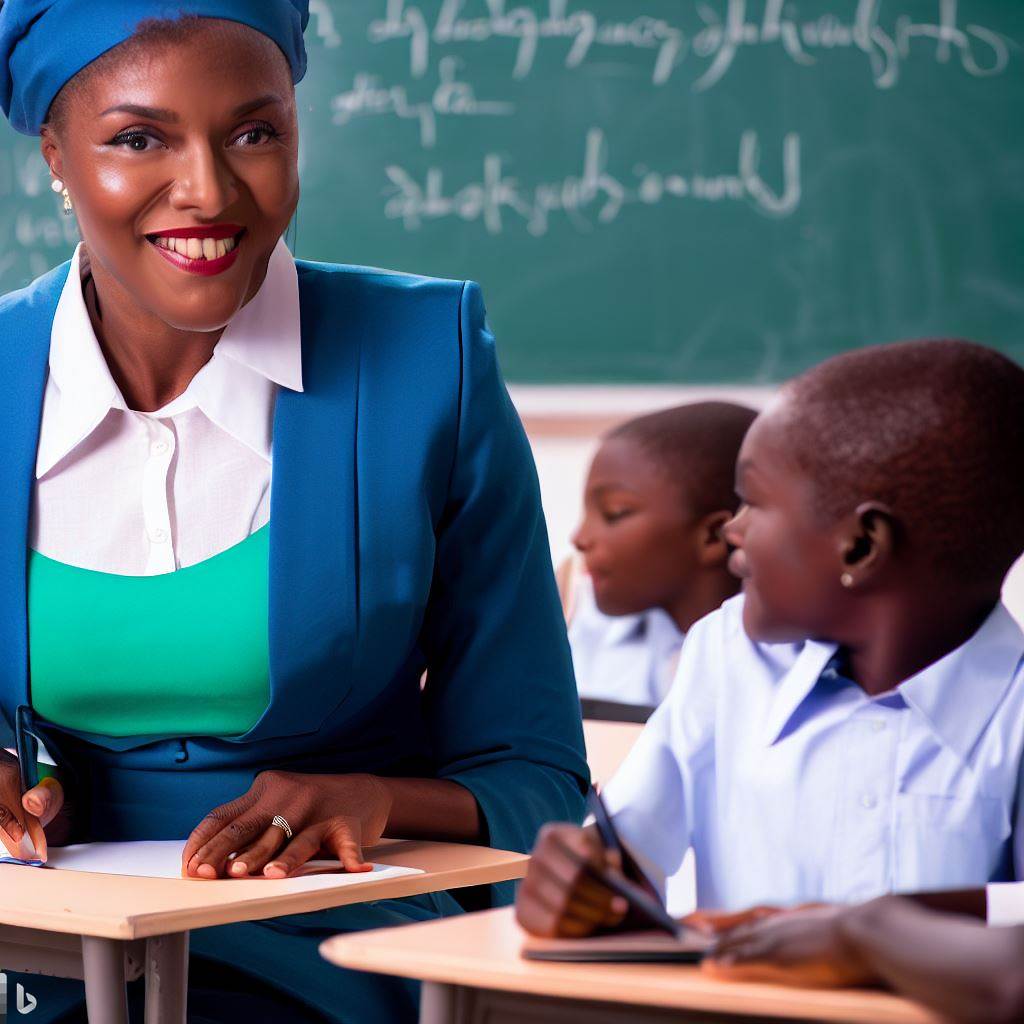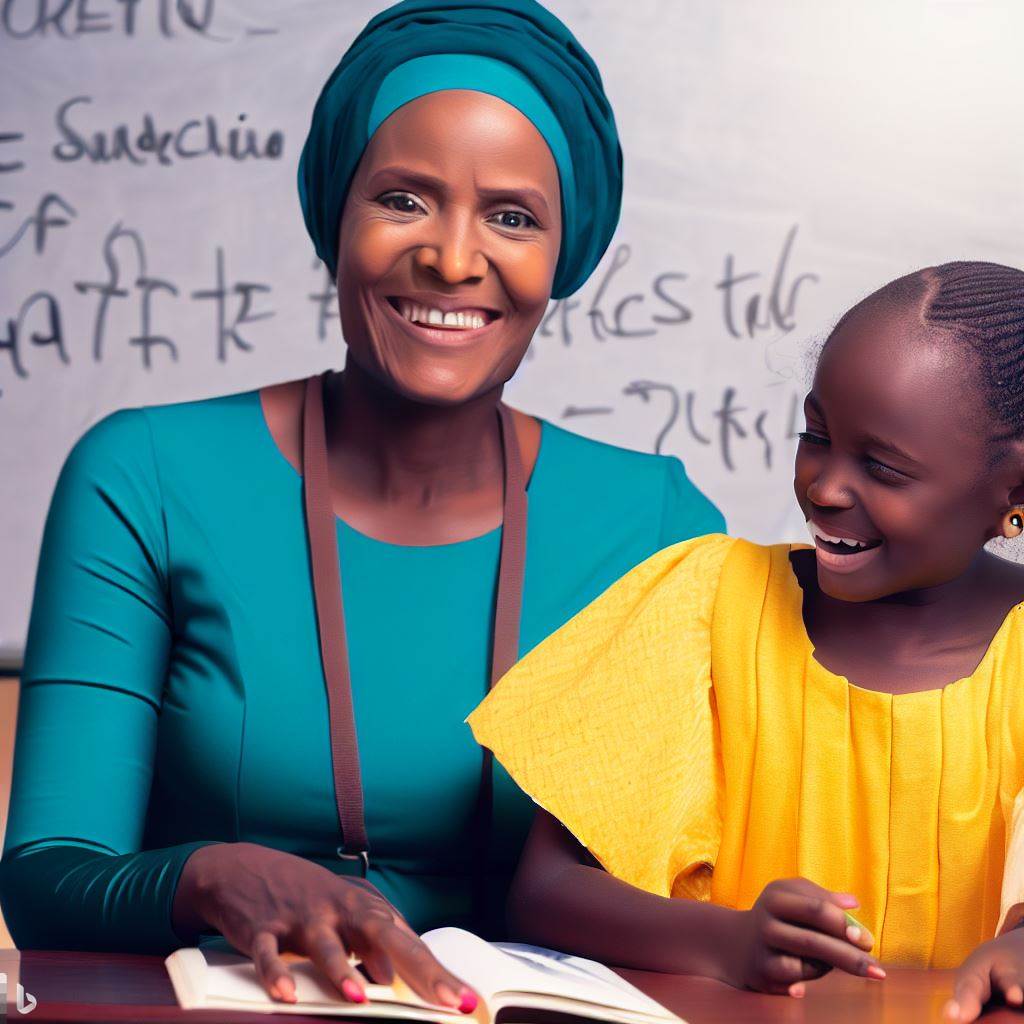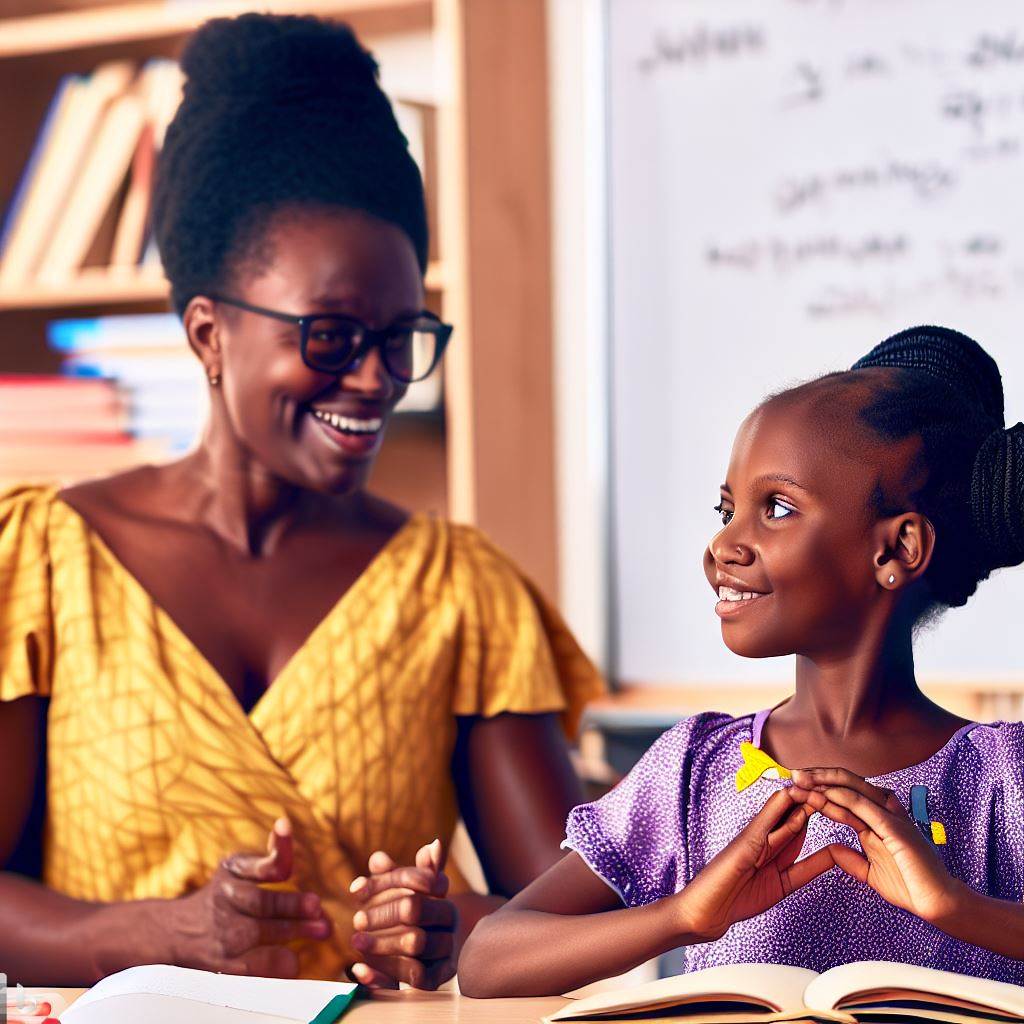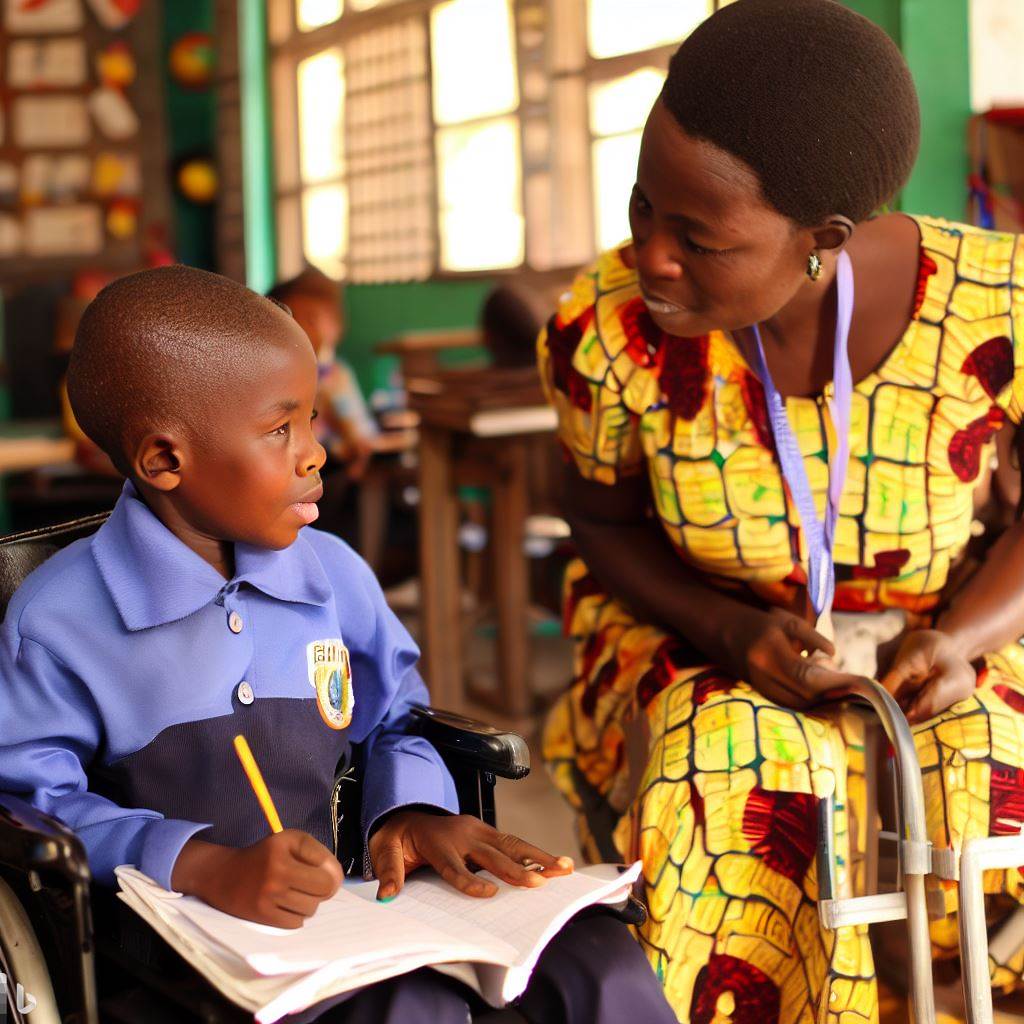Introduction
Special education in Nigeria focuses on providing educational support to students with special needs.
Successful special education teachers play a crucial role in helping students with diverse learning needs to succeed.
The purpose of this blog post is to highlight case studies of successful special education teachers in Nigeria.
Special education in Nigeria is a field that aims to provide educational support to students with special needs.
These students may have disabilities or unique learning requirements that require specialized instruction.
In a country with a large population and limited resources, successful special education teachers play a critical role in ensuring that these students receive the support they need to thrive academically.
The importance of successful special education teachers cannot be overstated.
They possess the knowledge, skills, and expertise necessary to facilitate the learning and development of students with special needs.
These teachers have the ability to understand the unique challenges faced by their students and tailor their instruction accordingly.
By using evidence-based strategies and individualized approaches, they can help students overcome barriers and reach their full potential.
The purpose of this blog post is to explore case studies of successful special education teachers in Nigeria.
By examining real-life examples, we can gain valuable insights into the strategies and practices that contribute to their success.
These case studies will showcase the dedication, innovation, and resilience exhibited by these teachers in their daily work.
Additionally, they will provide inspiration and guidance to aspiring special education teachers in Nigeria and beyond.
In the end, successful special education teachers in Nigeria play a vital role in supporting students with special needs.
This blog post will showcase their achievements through case studies, emphasizing the importance of their work in creating inclusive and empowering educational environments.
Overview of Special Education in Nigeria
Brief history of special education in the country
- Special education in Nigeria has its roots in the early 20th century.
- The first special education schools were established in the 1950s.
- These schools aimed to provide education and support to children with disabilities.
- Initially, special education was limited to urban areas and children with physical disabilities.
- In the 1970s, the Nigerian government introduced policies to expand special education services.
Current state of special education programs
- Special education programs in Nigeria have grown significantly over the years.
- The government has established special education units in regular schools.
- These units cater to children with various disabilities, including intellectual, sensory, and physical impairments.
- Special schools have also been established to provide more intensive support to students.
- Special education programs aim to promote inclusive practices and ensure equal opportunities for all students.
Challenges faced by special education teachers
Special education teachers in Nigeria face numerous challenges in their profession.
- Limited resources, including teaching materials and technology, hinder effective instruction.
- Large class sizes make it difficult to provide individualized attention to students.
- The lack of specialized training for teachers in inclusive practices is a major challenge.
- Negative attitudes and stigma towards children with disabilities pose additional barriers.
- Limited support from parents and communities can also impact the success of special education programs.
Despite these challenges, dedicated and passionate special education teachers in Nigeria make a difference in students’ lives.
In fact, special education in Nigeria has made significant progress over the years. From humble beginnings, it has evolved into a system that aims to provide quality education and support to children with disabilities.
However, several challenges persist, such as limited resources, large class sizes, and negative attitudes. It is crucial to address these challenges to ensure the success of special education programs.
With the dedication and commitment of special education teachers, progress can continue to be made towards a more inclusive and equitable education system in Nigeria.
Read: Building Inclusive Classrooms: The Nigerian Perspective
Roles and Responsibilities of Successful Special Education Teachers
A successful special education teacher in Nigeria plays a crucial role in supporting and empowering students with disabilities.
They are dedicated professionals who possess a deep understanding of disabilities and the individual needs of their students.
Understanding disabilities and individual needs of students
- Identifying and assessing the unique learning requirements of students with disabilities.
- Adapting instructional strategies and materials to accommodate diverse learning styles and abilities.
- Keeping abreast of current research and trends in special education to enhance their knowledge and practice.
- Creating a supportive and inclusive learning environment that fosters the overall development of students.
Designing and implementing individualized education plans (IEPs)
- Collaborating with other professionals, such as psychologists and speech therapists, to conduct assessments and develop IEPs.
- Setting clear and measurable goals for each student, considering their strengths, weaknesses, and areas for improvement.
- Monitoring and evaluating students’ progress regularly, adjusting the IEPs as needed to ensure their success.
- Communicating and collaborating with parents to review and discuss the IEPs, involving them in the educational process.
Collaboration with parents, colleagues, and support staff
- Working closely with parents to understand their concerns, aspirations, and expectations for their child’s education.
- Regularly communicating with parents to provide updates on progress, challenges, and strategies being employed.
- Collaborating with colleagues and support staff to share ideas, resources, and best practices in special education.
- Attending and actively participating in team meetings, parent-teacher conferences, and professional development sessions.
Utilizing effective teaching techniques and resources
- Employing evidence-based instructional strategies and techniques tailored to meet individual student needs.
- Using assistive technologies and specialized tools to enhance learning and engagement.
- Adapting and modifying curriculum materials to address students’ abilities and challenges.
- Providing ongoing support and encouragement to students, fostering their self-confidence and independence.
In general, successful special education teachers in Nigeria have a diverse range of roles and responsibilities.
They possess a deep understanding of disabilities and individual student needs, design and implement individualized education plans, collaborate with parents and colleagues, and utilize effective teaching techniques and resources.
Their dedication and commitment contribute to improving the lives and educational outcomes of students with disabilities.
Read: Resources and Support for Special Education Teachers in Nigeria
Case Study 1: Mr. Adeola
Background information and experience
- Mr. Adeola is a dedicated special education teacher with 10 years of experience in Nigeria.
- He holds a bachelor’s degree in Special Education from a reputable university.
- Mr. Adeola has undergone specialized training in inclusive education and classroom management.
- His passion for teaching and helping students with disabilities is evident in his daily work.
Strategies used to engage students and create a positive learning environment
- Mr. Adeola believes in the power of differentiated instruction to meet the diverse needs of his students.
- He uses various instructional techniques, such as visual aids, manipulatives, and multisensory activities.
- Mr. Adeola incorporates technology into his lessons, utilizing assistive devices and interactive learning apps.
- He maintains a calm and supportive classroom atmosphere, providing clear expectations and consistent routines.
Success stories and student achievements
- One of Mr. Adeola’s students, David, struggled with reading comprehension due to dyslexia.
- Through individualized instruction and a structured reading program, David’s reading skills improved significantly.
- Another student, Mary, had difficulty with social interactions and communication.
- Mr. Adeola introduced a peer support program, which helped Mary develop social skills and make friends.
- Both David and Mary have made remarkable progress academically and socially under Mr. Adeola’s guidance.
Impact on the special education community
- Mr. Adeola’s dedication and innovative teaching techniques have inspired other special education teachers.
- He often shares his strategies and success stories at conferences and workshops.
- Many teachers have implemented his methods, resulting in improved outcomes for their students. Mr.
- Adeola believes in the importance of collaboration and regularly mentors new special education teachers.
- His positive influence extends beyond his classroom, positively impacting the special education community in Nigeria.
In essence, Mr. Adeola’s commitment to his students and his proficiency in special education have made him a successful teacher in Nigeria.
Through his personalized teaching strategies, he engages students and creates a positive learning environment.
The success stories and achievements of his students are a testament to his expertise and dedication.
Furthermore, Mr. Adeola’s impact on the special education community is evident through his mentorship and his willingness to share his knowledge and strategies with other teachers.
Read: Career Progression Paths for Special Ed Teachers in Nigeria

Case Study 2: Mrs. Ibrahim
Background information and experience
- Mrs. Ibrahim is a dedicated special education teacher in Nigeria with over 10 years of experience.
- She has a bachelor’s degree in Special Education and a master’s degree in Inclusive Education.
- Mrs. Ibrahim has undergone various training programs to enhance her teaching skills and knowledge.
- She has a deep understanding of the challenges faced by students with special needs in Nigeria.
Innovative teaching methods and instructional approaches
- Mrs. Ibrahim believes in the power of technology and uses it extensively in her classroom.
- She incorporates interactive educational software and multimedia tools to engage her students.
- Mrs. Ibrahim encourages hands-on learning experiences, allowing her students to explore and discover.
- She utilizes project-based learning to promote critical thinking and problem-solving skills.
Encouraging inclusive practices in regular classrooms
- Mrs. Ibrahim advocates for inclusive education and strongly believes that every child deserves equal opportunities.
- She collaborates with regular classroom teachers to create a supportive and inclusive learning environment.
- Mrs. Ibrahim promotes peer interaction and encourages regular students to be empathetic and supportive.
- She ensures that students with special needs participate in all classroom activities and group projects.
Recognition and awards received
- Mrs. Ibrahim’s exceptional dedication and innovative teaching methods have gained recognition.
- She has received multiple awards, including the “Outstanding Special Education Teacher” in her state.
- Mrs. Ibrahim’s contribution to inclusive education has been acknowledged by the Ministry of Education.
- Her success stories have been published in educational journals, inspiring other teachers in Nigeria.
In a nutshell, Mrs. Ibrahim is a remarkable special education teacher in Nigeria.
With her extensive experience, innovative teaching methods, and commitment to inclusive practices, she has created a positive impact on the education of students with special needs.
Her recognition and awards are well-deserved, highlighting her outstanding contributions to the field of special education in Nigeria.
Mrs. Ibrahim’s dedication and passion serve as an inspiration for other educators striving to make a difference.
Read: The Role of Technology in Special Education in Nigeria
Uncover the Details: The Demand for Teachers in Nigeria’s Education Sector
Case Study 3: Dr. Oni
Background information and qualifications
Dr. Oni is a highly qualified special education teacher in Nigeria. He holds a Ph.D. in Special Education from a renowned university.
His research focuses on inclusive education and the empowerment of students with disabilities. Dr. Oni has authored several publications on innovative teaching strategies for special education.
Advocacy efforts and involvement in policy development
Dr. Oni is actively involved in advocating for the rights of students with disabilities. He works closely with governmental agencies to develop and implement inclusive education policies.
Dr. Oni’s expertise has been instrumental in shaping the special education landscape in Nigeria. His efforts have led to the establishment of inclusive schools and resource centers across the country.
Professional development initiatives and mentorship programs
Dr. Oni is dedicated to improving the skills and knowledge of special education teachers. He conducts training workshops and seminars on evidence-based teaching strategies.
Dr. Oni also mentors young teachers, providing guidance and support in their professional development. His mentorship programs have produced successful special education professionals in Nigeria.
Influencing positive change in the special education field
Dr. Oni’s work has had a significant impact on the inclusion of students with disabilities. He has successfully challenged misconceptions and discriminatory practices in education.
Dr. Oni’s research findings have helped improve teaching methods and accommodations for students with disabilities.
His advocacy has led to increased funding and resources for special education programs in Nigeria. Dr. Oni’s dedication and expertise have inspired many educators to embrace inclusive education practices.
Basically, Dr. Oni is a remarkable special education teacher who has made a positive difference in Nigeria.
His qualifications, advocacy efforts, professional development initiatives, and influence on policy development have transformed the special education field.
Dr. Oni’s dedication to inclusive education and his commitment to empowering students with disabilities serve as an inspiration for educators worldwide.
Key Findings and Lessons Learned
Common characteristics among successful special education teachers
- Passion for working with students with special needs.
- Strong belief in the potential of every student to learn and succeed.
- Flexibility and adaptability to meet individual needs of students.
- Effective communication and collaboration with parents, colleagues, and other professionals.
- Continual assessment and evaluation of student progress and teaching methods.
Importance of ongoing professional development
- Continuous learning and acquiring new knowledge and skills.
- Staying updated with best practices and evidence-based strategies.
- Attending workshops, conferences, and training programs.
- Networking with other special education professionals.
- Implementing new techniques and approaches in the classroom.
Providing support and resources for special education teachers
- Access to specialized materials, assistive technologies, and teaching aids.
- Collaboration and mentorship opportunities with experienced teachers in the field.
- Administrative support in terms of workload and class size.
- Supportive and inclusive school environment.
Implications for improving special education in Nigeria
- Investment in special education training and professional development programs.
- Allocation of resources for specialized materials and assistive technologies.
- Development and implementation of inclusive policies and practices.
- Increasing awareness and understanding of special needs among the general population.
- Collaboration between government, schools, and relevant stakeholders for effective support.
All in all, successful special education teachers in Nigeria share common characteristics such as passion, belief in students’ potential, adaptability, and effective communication.
Ongoing professional development plays a crucial role in their success, enabling them to stay updated with best practices and implement new approaches.
Providing support and resources for special education teachers is essential, including access to materials, mentorship, and administrative support.
To improve special education in Nigeria, investment in training programs, allocation of resources, inclusive policies, and collaboration between stakeholders is necessary.
Conclusion
This post highlighted the success stories of special education teachers in Nigeria and emphasized the importance of recognizing and celebrating their achievements.
We discussed how these teachers have made a significant impact on the lives of students with special needs, overcoming challenges, and implementing effective strategies.
It is crucial to recognize and celebrate the efforts and accomplishments of these teachers as they play a vital role in providing quality education and support to students with special needs.
By acknowledging their success, we not only motivate and inspire other teachers but also raise awareness about the importance of inclusive education in Nigeria.
To aspiring special education teachers, this chapter serves as encouragement to pursue their passion and make a difference in the lives of students with special needs.
Although the journey may have its challenges, the stories of successful teachers showcased here demonstrate that it is possible to overcome obstacles and create meaningful change in special education.
By continuously learning, adapting teaching methods, and seeking support from colleagues, aspiring special education teachers can contribute to improving inclusive education practices in Nigeria.
By recognizing and celebrating successful special education teachers, we can inspire and create a positive impact on the education landscape in Nigeria.




